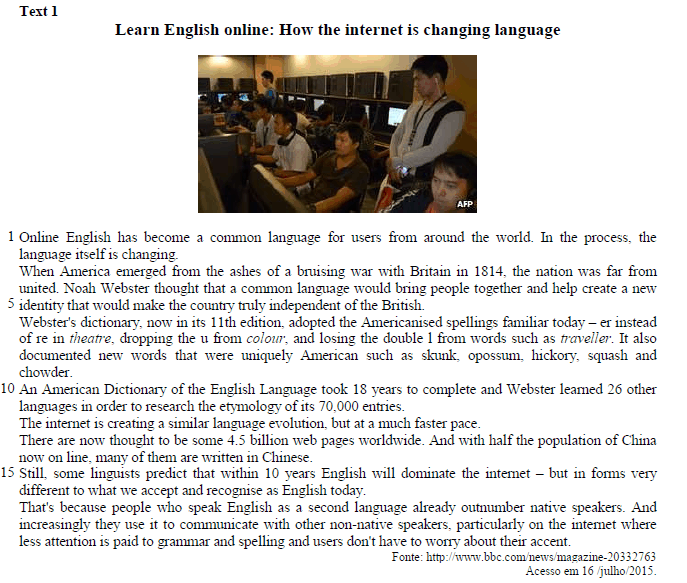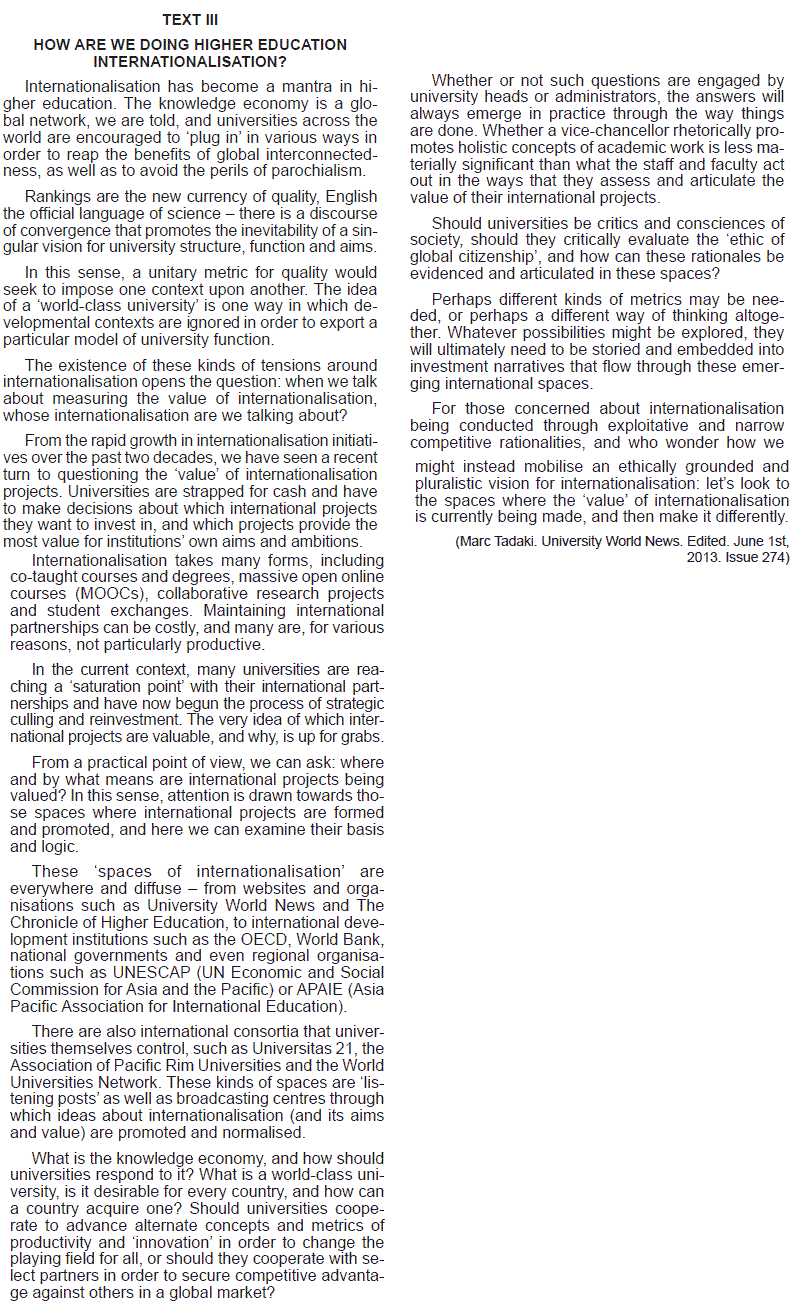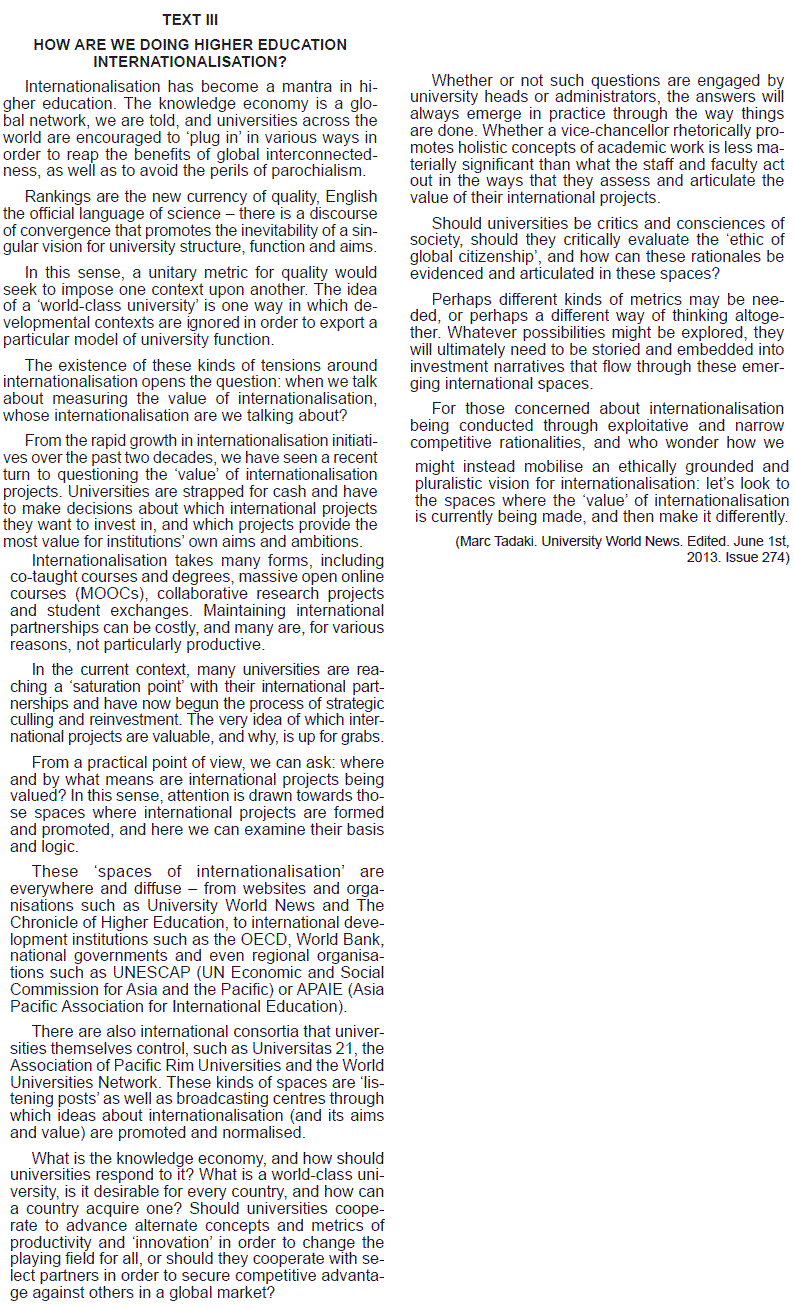Questões sobre Gramática
Lista completa de Questões sobre Gramática para resolução totalmente grátis. Selecione os assuntos no filtro de questões e comece a resolver exercícios.

In the process, the language itself is changing. (Linhas 1-2)
Os pronomes reflexivos na língua inglesa apresentam três funções: reflexiva, enfática e idiomática. Assinale a alternativa cujo pronome reflexivo expressa a mesma função da frase acima, retirada do texto.
- A. They raised the children themselves.
- B. The man cut himself with a knife.
- C. She likes making everything by herself.
- D. We hurt ourselves last week.
 Na frase Then maybe you shouldnt read books that need batteries, o verbo sublinhado expressa
Na frase Then maybe you shouldnt read books that need batteries, o verbo sublinhado expressa
- A. uma proibição.
- B. uma possibilidade.
- C. uma permissão.
- D. um aconselhamento.
Regardless of questions of poetic form, the line They mingle not with their laughing comrades again (l. 17) could be replaced by:
- A. they will not fight with their laughing comrades.
- B. they dont mingle with their laughing families.
- C. they do not share moments with their happy mates.
- D. they do not fight with their laughing comrades.
- E. the fallen will not fight with their happy comrades.
In the line But where our desires are and our hopes profound (l. 21):
- A. where is an interrogative pronoun.
- B. profound is a verb.
- C. desires and hopes are verbs.
- D. the verbal form are was deliberately suppressed after hopes.
- E. our is a possessive pronoun.
 Passive voice CANNOT be found in the following paragraph:
Passive voice CANNOT be found in the following paragraph:
- A. Negotiations have stumbled over the fundamental question of whether Myanmar will remain a united and highly centralized country controlled by the Burman ethnic group, or whether power will be devolved to minority groups.
- B. Photos of the rebels corpses were widely circulated on the Internet.
- C. We are outraged, said Mong Gwang, a captain with the Kachin Independence Army, which controls large swaths of territory along the border with China. This means further conflict is coming.
- D. Myanmar has been locked in an intermittent civil war from its earliest days of independence from Britain in 1948, and a cease-fire is considered a crucial part of President Thein Seins stated desire to deliver it from its abject poverty and dictatorial past.
- E. The shelling on Wednesday, which struck an officers training facility near the Chinese border that is run by the rebel group, the Kachin Independence Army, was the most severe flare- up of violence since rebels and government troops battled around the rebel capital, Laiza, two years ago.
 By derivation, the adverb highly (l. 52) is formed from the adjective high. The following sequence contains only adverbs formed by the same derivational process:
By derivation, the adverb highly (l. 52) is formed from the adjective high. The following sequence contains only adverbs formed by the same derivational process:
- A. ally; powerfully; greatly; kindly; tenderly.
- B. greatly; commonly; fastly; wonderfully; interestingly.
- C. internationally; powerfully; unfortunately; mainly; fairly.
- D. lovely; hardly; friendly; internationally; mainly.
- E. friendly; manly; lovely; fastly; quickly.
 We are outraged, said Mong Gwang, a captain with the Kachin Independence Army, which controls large swaths of territory along the border with China (l.26-28). In indirect speech, the sentence could read as follows:
We are outraged, said Mong Gwang, a captain with the Kachin Independence Army, which controls large swaths of territory along the border with China (l.26-28). In indirect speech, the sentence could read as follows:
- A. Mong Gwang, a captain with the Kachin Independence Army, which controls large swaths of territory along the border with China, said that they are outraged.
- B. The Kachin Independence Army, which controls large swaths of territory along the border with China, said that captain Mong Gwang was outraged.
- C. The Kachin Independence Army, which controls large swaths of territory along the border with China, said that captain Mong Gwang was outraged.
- D. We are outraged. That was said by Mong Gwang, a captain with the Kachin Independence Army, which controls large swaths of territory along the border with China.
- E. Mong Gwang, a captain with the Kachin Independence Army, which controls large swaths of territory along the border with China, said they were outraged.
 No fragmento, os vocábulos em destaque correspondem, respectivamente, às preposições que indicam:
No fragmento, os vocábulos em destaque correspondem, respectivamente, às preposições que indicam:
- A. voz passiva tempo pertencimento lugar lugar lugar tempo.
- B. lugar lugar lugar voz passiva tempo pertencimento tempo.
- C. tempo tempo lugar lugar lugar pertencimento voz passiva.
- D. pertencimento tempo voz passiva lugar lugar lugar tempo.
 Punctuation has been changed in paragraphs 2 to 6. The only case that DID NOT cause any relevant change in meaning nor problem of cohesion is:
Punctuation has been changed in paragraphs 2 to 6. The only case that DID NOT cause any relevant change in meaning nor problem of cohesion is:
- A. In this sense, a unitary metric for quality would seek to impose one context upon another. The idea of a world-class university is one way in, which developmental contexts, are ignored in order to export a particular model of university function.
- B. The existence, of these kinds of tensions, around internationalization, opens the question. When we talk about measuring the value of internationalization whose internationalisation are we talking about?
- C. Rankings are the new currency of quality. English, the official language of science. There is a discourse of convergence that promotes the inevitability of a singular vision for university structure, function and aims.
- D. From the rapid growth in internationalisation initiatives, over the past two decades we have seen a recent turn to questioning the value of internationalisation projects. Universities are strapped for cash, and have to make decisions about which international projects they want to invest in, and which projects provide the most value, for institutions own aims and ambitions.
- E. Internationalisation takes many forms, including co-taught courses and degrees, massive open online courses (MOOCs), collaborative research, projects and student exchanges, maintaining international. Partnerships can be costly, and many are, for various reasons, not particularly productive.
 In Should universities be critics and consciences of society, should they critically evaluate the ethic of global citizenship, and how can these rationales be evidenced and articulated in these spaces? (paragraph 13), the words in bold face are, respectively:
In Should universities be critics and consciences of society, should they critically evaluate the ethic of global citizenship, and how can these rationales be evidenced and articulated in these spaces? (paragraph 13), the words in bold face are, respectively:
- A. adjective; adjective; adverb; adjective; adjective.
- B. noun; noun; adjective; noun; adjective.
- C. noun; noun; adverb; adjective; adjective.
- D. noun; noun; adverb; noun; noun.
- E. adjective; noun; adverb; adjective; noun.


